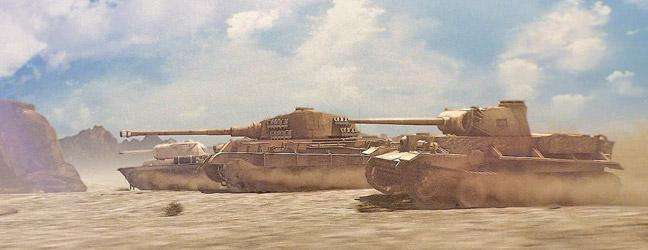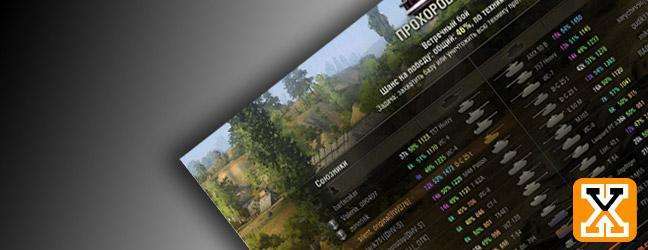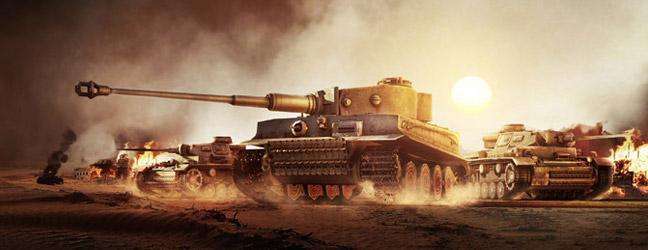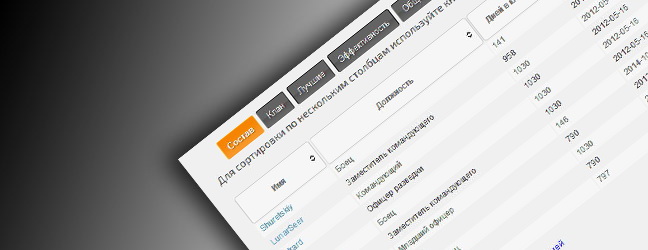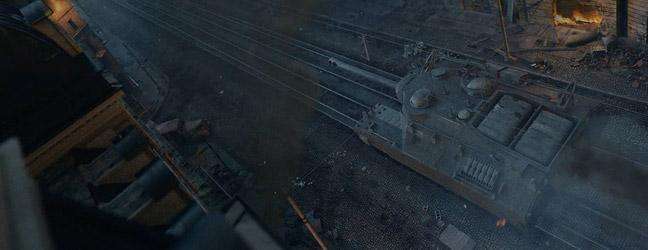Manual #1: Clans and Clan Management
Дата: 08.08.2013 20:18:07
Quemapueblos: 
Creating a Clear Foundation:
Organizing the clan is one of the more important parts of having a large group of people playing together, no matter the purpose of the clan (enjoyment, clan wars, tournaments, etc). Having a commander is an obvious must, someone needs to be heading up the clan, beyond that is where it gets tricky. Some clans follow the system that Wargaming already has set up, which is Commander, Deputy Commander, Field Commander, Diplomat, Recruiter, Soldier, and Recruit. For all intents and purposes involved in World of Tanks, those are fairly well set up as it gets most of the job done. Titles are just titles, however, and sometimes clans have internal structures that are not quite in line with how Wargaming has the system set up.
In some cases, there is no single commander. While there is one in title, he is only the person who spent the 2500 Gold required to actually make the clan, while his Deputy Commanders (hereby referred to as DepComs) are actually wielding just as much administrative power and responsibility as the Commander of the clan. For a clan to have a concise chain of command, someone (or someones) have to be at the top who make the big calls such as where to land, whom to engage in diplomacy with, how to recruit, so on and so forth. Below them you will typically find people who make administrative decisions that are only internal, such as calling battles, recruiting, setting people up properly on their VoIP program of choice, making sure people are doing their jobs, setting up trainings, so on and so forth. Below them you’ll find that Field Commanders (or Battle Leaders/Callers) and Diplomats roughly on the same level, although some clans have their Commander and DepComs handle all diplomacy. Field Commanders generally are the ones calling battles, but again, Commanders and DepComs are also common in this role as well.
Throughout those levels, all administrative actions of the clans should have already taken place unless there is a specific person or persons that are doing the recruiting for the clan.
Soldiers and recruits need to know their place in the clan, mavericks work for some clans, they don’t work for others. It’s about the environment. Setting up a clear line of rules for how you expect people to conduct themselves in the game, on the forums, or on any external World of Tanks related websites.
General rules for chat and interaction:
There are clans out there that prohibit their members from engaging in discussions in the Clan Rivalry/Diplomacy section. There are some who have no restrictions; some allow discussion but no flame baiting. That’s all dependent on what kind of image that you would like your clan to give off. Making sure that people are aware of what they are allowed to do is important because many a clan has fallen by the wayside simply because of the public conduct of their members. This falls into the actual game itself, where you need to make sure those members that are carrying your tags are aware of how you’d like the public to recognize said tags.
It is recommended that people not in an administrative position speak for the clan, despite representing the tags in game. Reason being is that there are regularly movements going on in the upper echelon of a clan that the typical soldier is not privy to, and as such, a few sentences can sour a diplomatic relationship between clans or get a clan a bad reputation. Making sure that your members interact with others in a proper fashion is critical to maintaining a public image.
Officer duties/permissions:
While the duties were covered above, permissions have not yet been addressed.Each rank defines a set of permissions.
Permissions can be granted only with the ranks.
Ranks cannot be edited to customize permissions for each position.
Everyone in the clan has only one role.
Various rank's permissions overlap (as seen in the table below).
The role “Clan Commander” cannot be given, only transferred to another member.
A recruit is not valued to have any information, only having whatever resources the clan has external from Wargaming’s clan system and the in-game clan chat system. Recruits must go to the clan’s page on the website and look up the battle schedule to see what the schedule actually is.
Soldiers are able to see chips on the map, borders of the clan, the state of the chips, and upcoming battles based upon the provinces.
Company Commanders are able to move chips and have all permissions of soldiers beyond that.
Deputy Commander s have nearly full rights to the clan, other than disbanding the clan, as the Commander is the only member of the clan with this ability (Commanders and DepComs share all other permissions the same).
Recruiters are able to accept applications and invite others to the clan.
Diplomats, at the moment, are a position in name only and are effectively soldiers.
Treasurers are able to disperse payments to clan members. Permissions Definitions
Chips are Visible- The Clan Wars map shows where your clan's have been chips placed
Espionage Acts - Access to spies and counter-spies
Move Chips- Place and move chips on the Clan Wars map
Move HQ- Move your clan's Headquaters to another province you own
Access to Treasury- Allocate gold to members of the clan
Remove/Promote Members- Change member's position in the clan and remove members
Recruit Players- Invite players to the Clan (cannot remove or modify current members)
Modify Clan Logo/Info- Change the Clan's name, tag, logos, description and motto

Examples of Organizational Structure:
Example #1:
Clan Commander - ran everything. Most diplomacy was done by the Commander, although some was done by Diplomats.
Deputy Commanders - took up mutual roles of the Commander when the Commander was unavailable or otherwise engaged.
Company Commanders - ran the battles for the clan, made the trainings, walked the team through the strategies employed, and made sure everything was in order to properly fight on the UC map.
Recruiters - recruit new members. Not much to say about that.
Treasurer - None, all payments were done by the Commander or DepComs.
Soldiers - fought in battles and were paid accordingly for participation.
Recruits - were treated as Soldiers, but with a 14-day probationary period where the clan was able to terminate the membership of the clan with a mutual understanding that it would be a post-application acceptable breach of conduct.
Diplomats - are rarely a working product of a clan due to a break down in communication or conflicting interests, the most common simply being the diplomat having outdated information as decisions can and will be made on the fly. More commonly the Command or DepCom of the clan will be a functioning diplomat because they're going to have a better grasp of what they want their clan to be doing, what they want, what they need. There are instances of diplomats being a touching base point for clans, they'll talk to the diplomat first, but for more extended conversations pertaining to complex and complicated deals the more common person to speak with will be someone higher up on the chain of command. This, of course, all entirely depends on the overall structure of the clan. If there is an oligarchy, someone may have the same power as the Commander, but be the functioning diplomat and field everything for the clan diplomatically.
Example #2:
Clan Commander -acts as the final decider of the big issues but doesn't get involved with the ground level operations. He deals mostly with other Clan Commanders and Deputies get the master plan for the whole clan.
Deputy Commanders - are the managers of the clan. They take the Clan Commander's master plan and figure out how to actually get it done. They actually figure out when and where to move chips, schedule battles and all the logistics required to get the big picture moving.
Company Commanders -assist the deputy commanders in accomplishing thier tasks. They work much more closely with the rest of the rank and file members to make sure things go according to plan.
Recruiters - have one job. That is to work day and night trying to find new members. Either browsing the forums constantly or contact exceptional players without a clan after battle.
Treasurer -is focused on the gold side of things. They are the accountants that make sure the clan has the gold it needs to run its events or pay out members.
Soldiers - are the grunts on the ground. There job is to shoot straight and go where they are told.
Recruits - don't get many of the benefits of the clan until they have proved they are willing to stick around and play nice with others.
Diplomats - can assist the Clan Commander in finding helpful allies and setting up meetings.
Example #3:
Clan Commander - runs anything and everything. He has complete control over when and where the clan fights, how much gold members earn for participation and who gets to join in the fun.
Recruits - are everyone else. This prevents anyone outside of the commander from seeing much of the Clan's data and map information. All information and jobs must be delegated through the commander.
What goals you plan on shooting for:
The main thing that any clan should be going for is whatever they feel fits their style. A tournament based clan may not want to be large, but have only good players, and has little use for most of the features involved in the clan system.
When it comes to clans active on the Ultimate Conquest map, however, the biggest thing is to make sure that everything is running smoothly, that people are content with the organization of the clan, and that there are little to no complaints. Each clan will function as a micronation within World of Tanks, and should be treated as such. Your soldiers are your people, your officers are your confidants, and should any one party be upset the best course of action is an amicable resolution to the problem (barring breach of conduct).
Attendance and availability is another very important matter. Making sure that you have enough people interested in active enough to actually find themselves in battles is a massive conduit to success. If you’re on bordering time zones, make sure that you have enough people for each time zone, ideally to fight in two battles at the same time (roughly 30 people on during those times, ready to fight).

Creating a Clear Foundation:
Organizing the clan is one of the more important parts of having a large group of people playing together, no matter the purpose of the clan (enjoyment, clan wars, tournaments, etc). Having a commander is an obvious must, someone needs to be heading up the clan, beyond that is where it gets tricky. Some clans follow the system that Wargaming already has set up, which is Commander, Deputy Commander, Field Commander, Diplomat, Recruiter, Soldier, and Recruit. For all intents and purposes involved in World of Tanks, those are fairly well set up as it gets most of the job done. Titles are just titles, however, and sometimes clans have internal structures that are not quite in line with how Wargaming has the system set up.
In some cases, there is no single commander. While there is one in title, he is only the person who spent the 2500 Gold required to actually make the clan, while his Deputy Commanders (hereby referred to as DepComs) are actually wielding just as much administrative power and responsibility as the Commander of the clan. For a clan to have a concise chain of command, someone (or someones) have to be at the top who make the big calls such as where to land, whom to engage in diplomacy with, how to recruit, so on and so forth. Below them you will typically find people who make administrative decisions that are only internal, such as calling battles, recruiting, setting people up properly on their VoIP program of choice, making sure people are doing their jobs, setting up trainings, so on and so forth. Below them you’ll find that Field Commanders (or Battle Leaders/Callers) and Diplomats roughly on the same level, although some clans have their Commander and DepComs handle all diplomacy. Field Commanders generally are the ones calling battles, but again, Commanders and DepComs are also common in this role as well.
Throughout those levels, all administrative actions of the clans should have already taken place unless there is a specific person or persons that are doing the recruiting for the clan.
Soldiers and recruits need to know their place in the clan, mavericks work for some clans, they don’t work for others. It’s about the environment. Setting up a clear line of rules for how you expect people to conduct themselves in the game, on the forums, or on any external World of Tanks related websites.
General rules for chat and interaction:
There are clans out there that prohibit their members from engaging in discussions in the Clan Rivalry/Diplomacy section. There are some who have no restrictions; some allow discussion but no flame baiting. That’s all dependent on what kind of image that you would like your clan to give off. Making sure that people are aware of what they are allowed to do is important because many a clan has fallen by the wayside simply because of the public conduct of their members. This falls into the actual game itself, where you need to make sure those members that are carrying your tags are aware of how you’d like the public to recognize said tags.
It is recommended that people not in an administrative position speak for the clan, despite representing the tags in game. Reason being is that there are regularly movements going on in the upper echelon of a clan that the typical soldier is not privy to, and as such, a few sentences can sour a diplomatic relationship between clans or get a clan a bad reputation. Making sure that your members interact with others in a proper fashion is critical to maintaining a public image.
Officer duties/permissions:
While the duties were covered above, permissions have not yet been addressed.Each rank defines a set of permissions.
Permissions can be granted only with the ranks.
Ranks cannot be edited to customize permissions for each position.
Everyone in the clan has only one role.
Various rank's permissions overlap (as seen in the table below).
The role “Clan Commander” cannot be given, only transferred to another member.
A recruit is not valued to have any information, only having whatever resources the clan has external from Wargaming’s clan system and the in-game clan chat system. Recruits must go to the clan’s page on the website and look up the battle schedule to see what the schedule actually is.
Soldiers are able to see chips on the map, borders of the clan, the state of the chips, and upcoming battles based upon the provinces.
Company Commanders are able to move chips and have all permissions of soldiers beyond that.
Deputy Commander s have nearly full rights to the clan, other than disbanding the clan, as the Commander is the only member of the clan with this ability (Commanders and DepComs share all other permissions the same).
Recruiters are able to accept applications and invite others to the clan.
Diplomats, at the moment, are a position in name only and are effectively soldiers.
Treasurers are able to disperse payments to clan members. Permissions Definitions
Chips are Visible- The Clan Wars map shows where your clan's have been chips placed
Espionage Acts - Access to spies and counter-spies
Move Chips- Place and move chips on the Clan Wars map
Move HQ- Move your clan's Headquaters to another province you own
Access to Treasury- Allocate gold to members of the clan
Remove/Promote Members- Change member's position in the clan and remove members
Recruit Players- Invite players to the Clan (cannot remove or modify current members)
Modify Clan Logo/Info- Change the Clan's name, tag, logos, description and motto

Examples of Organizational Structure:
Example #1:
Clan Commander - ran everything. Most diplomacy was done by the Commander, although some was done by Diplomats.
Deputy Commanders - took up mutual roles of the Commander when the Commander was unavailable or otherwise engaged.
Company Commanders - ran the battles for the clan, made the trainings, walked the team through the strategies employed, and made sure everything was in order to properly fight on the UC map.
Recruiters - recruit new members. Not much to say about that.
Treasurer - None, all payments were done by the Commander or DepComs.
Soldiers - fought in battles and were paid accordingly for participation.
Recruits - were treated as Soldiers, but with a 14-day probationary period where the clan was able to terminate the membership of the clan with a mutual understanding that it would be a post-application acceptable breach of conduct.
Diplomats - are rarely a working product of a clan due to a break down in communication or conflicting interests, the most common simply being the diplomat having outdated information as decisions can and will be made on the fly. More commonly the Command or DepCom of the clan will be a functioning diplomat because they're going to have a better grasp of what they want their clan to be doing, what they want, what they need. There are instances of diplomats being a touching base point for clans, they'll talk to the diplomat first, but for more extended conversations pertaining to complex and complicated deals the more common person to speak with will be someone higher up on the chain of command. This, of course, all entirely depends on the overall structure of the clan. If there is an oligarchy, someone may have the same power as the Commander, but be the functioning diplomat and field everything for the clan diplomatically.
Example #2:
Clan Commander -acts as the final decider of the big issues but doesn't get involved with the ground level operations. He deals mostly with other Clan Commanders and Deputies get the master plan for the whole clan.
Deputy Commanders - are the managers of the clan. They take the Clan Commander's master plan and figure out how to actually get it done. They actually figure out when and where to move chips, schedule battles and all the logistics required to get the big picture moving.
Company Commanders -assist the deputy commanders in accomplishing thier tasks. They work much more closely with the rest of the rank and file members to make sure things go according to plan.
Recruiters - have one job. That is to work day and night trying to find new members. Either browsing the forums constantly or contact exceptional players without a clan after battle.
Treasurer -is focused on the gold side of things. They are the accountants that make sure the clan has the gold it needs to run its events or pay out members.
Soldiers - are the grunts on the ground. There job is to shoot straight and go where they are told.
Recruits - don't get many of the benefits of the clan until they have proved they are willing to stick around and play nice with others.
Diplomats - can assist the Clan Commander in finding helpful allies and setting up meetings.
Example #3:
Clan Commander - runs anything and everything. He has complete control over when and where the clan fights, how much gold members earn for participation and who gets to join in the fun.
Recruits - are everyone else. This prevents anyone outside of the commander from seeing much of the Clan's data and map information. All information and jobs must be delegated through the commander.
What goals you plan on shooting for:
The main thing that any clan should be going for is whatever they feel fits their style. A tournament based clan may not want to be large, but have only good players, and has little use for most of the features involved in the clan system.
When it comes to clans active on the Ultimate Conquest map, however, the biggest thing is to make sure that everything is running smoothly, that people are content with the organization of the clan, and that there are little to no complaints. Each clan will function as a micronation within World of Tanks, and should be treated as such. Your soldiers are your people, your officers are your confidants, and should any one party be upset the best course of action is an amicable resolution to the problem (barring breach of conduct).
Attendance and availability is another very important matter. Making sure that you have enough people interested in active enough to actually find themselves in battles is a massive conduit to success. If you’re on bordering time zones, make sure that you have enough people for each time zone, ideally to fight in two battles at the same time (roughly 30 people on during those times, ready to fight).
Manual #1: Clans and Clan Management





